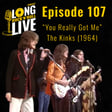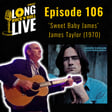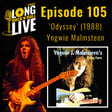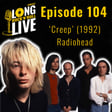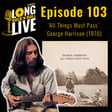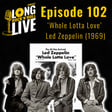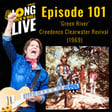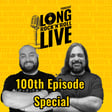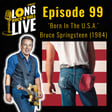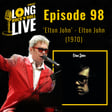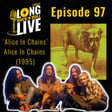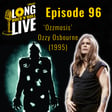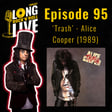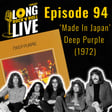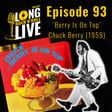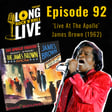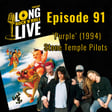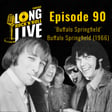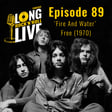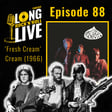Intro and Weather Chat
00:00:15
Speaker
Hello there, and welcome to another episode of the Long Live Rock and Roll Podcast. As usual, your hosts are with you, Mr. Lazma Khaledi's on the screen opposite me, Mr. Felipe Amorim. How are you doing, bro? All good, bro. How's everyone doing? Hope you guys are having a good time. Yeah, yeah. It's all to me now, isn't it? What's it like in London? Is it all rainy or is it okay?
Why Focus on Albums?
00:00:37
Speaker
It's warmer than I expected, to be honest. I thought it would be really, really cold by now. It's pretty cool. And here in Soho, it's a lovely day. And I'm thinking about going out for a coffee at some point, but I'm having my third cup of coffee at home now. Fantastic. I'm having the fourth cup of coffee in the streets at some point.
00:00:58
Speaker
drink of the day has been established. So welcome back to the show. Today we're doing another album episode and I thought I'd explain to you guys why we're doing some albums. Me and Felipe thought that actually, you know, if we talk about bands,
00:01:13
Speaker
You can only talk about them once, and then you move on, isn't it? Sometimes it's like, yeah, I didn't want sort of the earliest episodes of our of our podcast to sort of get when we we tick off all the bands we love. And suddenly, two years into the podcast, we don't have any more bands to talk about, whereas albums, whereas albums, there are plenty of them, trust me, some albums, some albums that from bands that we're not big fans, but still like the album, you know, like,
00:01:40
Speaker
And yeah, we're getting recommendations.
US vs UK Album Versions
00:01:42
Speaker
People are saying to us, you should do this album. And I'm loving it because I'm hearing so much new music from this, you know, this this rock and roll era that we're talking about, you know, which we think we're kind of classing from the 50s through to well, it's up to nowadays, you know, our definition of rock and roll is musical freedom, so it can be whatever and whenever. But these kind of 60s, 70s, 80s albums that people are saying and that you're recommending as well, bro, they've just been wicked.
00:02:08
Speaker
But albums are more plentiful and a band who has plenty of them is who we are talking about today. So the band in question are the Rolling Stones and we are talking about their 1967 album Between the Buttons.
Artistic vs Commercial Interests
00:02:22
Speaker
And I was going to say it was the fifth album of theirs, but on closer inspection on my notes, it's actually the fifth UK album and the seventh album. Do you have anything to say about that? Because I couldn't really understand it. How did they release an album?
00:02:38
Speaker
in the US but not in the UK? What was it like that? Did you have any insight? I think that was really common with the Beatles as well because they had some special albums for America like Compilations and stuff, I guess. Because of singles, the nature of releasing music at the time was entirely based on the singles model. You release a single and then you release an album. There's some weird things that happen in that sense.
00:03:04
Speaker
the the the the single of this album you know let's spend the night together it's part of the american version of the album but it's not on
Mick Jagger's Album Philosophy
00:03:12
Speaker
the the uk's version of the album so i think like uh it's you would have to go album by album but with the stones and the beatles what happened a lot was they had some singles released in the uk that were not part of the albums they have some they had some songs released in some albums that were not like
00:03:29
Speaker
that would not release in the UK or not release in America. And from time to time, there would be compilations of singles that would become an album only in America. Or maybe like after the band was popular in a country that would release like, oh, introducing the band as an album kind of stuff in America. So it's very confusing, really. I've compared the different versions of this album and it's like,
00:03:58
Speaker
The track list is different. Why? I mean, I understand not having some songs. But different orders as well. Yeah, exactly. It's a different track list. Like, oh, this song is somewhere else. I don't know why. I mean, you have to imagine that people behind the record labels at the time in America were probably thinking, well, you know, the American audiences are different. Maybe they need to listen to the hits first or whatever.
00:04:21
Speaker
I don't know, I have no idea why those decisions were made, but I'm pretty sure the band wasn't totally in charge of making that artistic decision, because it becomes an artistic
Artistic Vision vs Commercial Interests
00:04:32
Speaker
decision, changing the order of the songs. Well, it's funny, because when I was doing some reading about this album, Mick Jagger said that he basically said that it was an album that was meant to be an album. He said it's a sound experience rather than a song experience, which to me tells me that
00:04:51
Speaker
It's the overall album that you listen to, not individual songs. And we spoke about this on one of the episodes where we did Rubber Soul by The Beatles. We established that was one of the first pop albums, if you like, that was an album for the sake of an album experience and not just 11 singles put together on one CD or vinyl.
00:05:12
Speaker
And that's really interesting because he has said that it was a sound experience rather than song experience, but everything you said goes against that. Because if you make a sound experience, then things like track listing and where this track goes on the album matters. And so for the label or whoever was in charge to just switch things around wherever they felt necessary is kind of odd, isn't it?
Single Choices and Performance
00:05:38
Speaker
is because they think in a commercial way whilst the music that's that's really like that's a classic kind of conflict between artists and labels is like you have the artistic view and I have the commercial view and they never seem to find a middle ground it's always a bit like I want it to be like this this is the right way and the label says no this is the right way
00:06:00
Speaker
because that's going to sell. Obviously, I understand the importance of making something commercially viable. On the other hand, do record labels really know what people want?
00:06:16
Speaker
Or they just guess. Because the thing is what Henry Ford said about cars. He said, well, if I ask people's opinion, they would ask me to bring them faster horses instead of cars, because no one knew what a car was like. So when you're producing an album as creative as this one, I think,
00:06:42
Speaker
you're just trying to deliver something that people never heard before. So how can the label know what is commercial or what is not commercial from the album? I think they did make a good choice, maybe the band was involved with the single, although the result wasn't expected because they released Let's Spend the Night Together as the A side and Ruby Tuesday as the B side, but Ruby Tuesday went number one.
00:07:06
Speaker
Did it really? Oh yeah, I thought they both did, but no, you're right. Yeah, they didn't. No, yeah, it was the fourth number one hit the Stones out in America. Ruby Tuesday is just, it might be one of my top 20 songs of all time. I think it's a really stunning song. It's perfect. Yeah, it is. That beautiful piano behind it is just so nice.
Genre Influences and Comparisons
00:07:30
Speaker
But that is funny, isn't it? The song they chose as the B side was the more successful one.
00:07:35
Speaker
Yeah, yeah, because again, you don't know what people are actually going to like. And apparently in America, the radius, they played an important role on pushing for Ruby Choosing instead of Let's Spend the Night Together, because Let's Spend the Night Together has a very sexual nature on the lyrics. And, you know, maybe some more conservative minds were like, oh, this is not cool. You know, Ruby Tuesday is kind of, yeah.
00:08:00
Speaker
Yeah, exactly. It'll be shocking or whatever. I don't know if you know the Ed Sullivan Show story about that song. I don't know the story, no. Go and tell us. Oh, I'll tell you that. That's a really cool one. Basically, they were about to perform. That was in
00:08:16
Speaker
I think it was in six to seven year. They were about to perform Let's Spend the Night Together. And Sullivan said, no, that's too sexual. We can't say Let's Spend the Night Together. It doesn't even sound that bad nowadays. It's like you can't say that on my show. So either the song goes or you go. And Sullivan said that. So they changed the lyrics to Let's Spend Some Time Together.
00:08:42
Speaker
I mean, if making that concession is a good thing, if it's rock and roll or not, it can even be seen for me as, okay, we found a way out of it. We're making a point here. I think it was cool that they actually did that, instead of simply not performing. I think it was a good idea. I think it's funny. Let's Spend the Night Together is the most Rolling Stones song on the album, as in you just hear it and it's just, you've got that kind of
00:09:08
Speaker
You've got the rock and roll feel to it, the driving beat that goes through it. It's got some, I don't know, bluesy instrumentation and tone, but it's not a blues song. And it just has that upbeat pop rock vibe, doesn't it? There's a bit of, I see the drumming on that song specifically, it's a heavy Motown. Yeah.
00:09:32
Speaker
I heard that throughout the album and the drums throughout the album have been incredible.
Baroque Pop Exploration
00:09:36
Speaker
Before we talk about songs, I'll just give you the the Laz info bit. So the album is Between the Buttons by The Rolling Stones released 20th of January 1967, recorded between August and December 1966. That's quite a lengthy recording process. It was done between the RCA studio in Hollywood and the IBC in London.
00:09:57
Speaker
And this one I wanted to talk about is the genres associated with it. So there were three main ones that I came across and that was pop rock, psychedelic rock and baroque pop. So pop rock, I think that's pretty simple. You know, you've got the Beatles, the Kinks, all doing, you know, the Who, all doing their thing in the 60s, which is this rock instrumentation, but with poppy choruses, poppy melodies.
00:10:20
Speaker
Psychedelic rock. Now, this is what I thought was interesting because the year before 1966, the Beatles had done Revolver, which was very psychedelic. They focus quite a lot on using a lot of innovative production techniques and new instruments as well. The sitar is heavily focused. What songs are they? There's one called Love You Too.
00:10:43
Speaker
and Tomorrow Never Knows from Revolver by the Beatles. So the psychedelic rock you can kind of hear a year later the stones give their interpretation of okay that's how the Beatles do psych rock, this is how the stones are going to do it. And the final genre thing is the baroque pop. Now we have spoken about this a few times actually, we did it way back one of the first steps, I know it was, it was Hendrix because Hendrix had a harpsichord on one of his songs
Psychedelic Rock and Live Performances
00:11:09
Speaker
But David Bowie, we talked when we did the Hunky Dory episode, that's a Baroque pop. And so I kind of had my guess about what Baroque pop was, but I went a bit deeper for this episode and just tried to find out what it was. So Baroque pop is a fusion genre. But for people who don't know, Baroque is a style of classical music. There's a few classical music styles. You've got classical music.
00:11:35
Speaker
Baroque romantic music. And these are all eras, you know, I don't know how long they last, a couple of hundred years per era. And this is how the same way that you have blues to hard rock to heavy metal, that kind of is the same progression in classical music over hundreds of years. So Baroque is one of those. Johann Sebastian Bach, one of the most famous Baroque composers. So Baroque pop is a few. And he wrote loads of stuff for the Habsburg, isn't it? Say again.
00:11:58
Speaker
uh bar wrote loads of pieces for the the harpsichord that's it yeah so that's presently in the album that's exactly so we heard harpsichord in hendrix we heard it in the stones and we heard in hunky dory as well um so baroque pop a fusion of genre rock music plus classical music as well but not necessarily classical music more about the orchestration and the instruments used
00:12:22
Speaker
it emerged in the 60s when artists pursued a more orchestral sound and we spoke about that in depth on hunky dory and there's elements of it here as well so i just thought i'd sort of um clear that up about what baroque pop is so it's basically rock pop music with classical orchestration and instruments playing um so with that in mind where do you want to start first bro is there a particular track you wanted to go the theme of the album or
00:12:48
Speaker
There's a couple of things I actually want to say about the album and comparing that incarnation of the Stones with the current one or with whatever they've been doing for the last 30 years, because if you think about it, like when you mentioned the styles of the album, I would say the number one thing that comes to my mind is psychedelic.
Studio Creativity vs Live Sound
00:13:07
Speaker
That's what the album is for me. And it does remind me a lot of the Beach Boys and the Beatles. Yeah.
00:13:14
Speaker
especially because of the vocal harmonies which are not really the strongest feature in the Rolling Stones.
00:13:23
Speaker
Well, exactly. When you see them live with all the session musicians with them, the touring band, you have people who are hired specifically to do backing vocals. So that's specific things. They know what they're doing there. But the band, like the Stones as a band without hiring backing vocalists, doing vocal harmonies, that's something you don't see them doing nowadays.
00:13:50
Speaker
And also the Stones, they're very famous as a touring band, as a live band. And there was a recent clash between McCartney and Jagger about Beatles versus the Stones. And I think they do that for...
00:14:06
Speaker
Whenever they disappear from the media for too long, they just say some bullshit to get some, you know, some mentions, I think. And then McCartney said something, oh, you know, the Beatles were like really creative, whatever. I mean, I'm paraphrasing here, I don't know exactly what he said, but he said something, was the Stones were a blues cover band, a blues cover band. So while
00:14:29
Speaker
Yeah, and then Mick Jagger, when asked about that, he was really polite, replying to that. He was like, oh yeah, no, Paul is a sweetheart, love him. But the Beatles, they had a completely different experience than the Stones, because they were in the studio all the time, whilst we decided to be a stadium rock band, which no one has done at the time. So you've got to understand that the whole career of the Rolling Stones is based on being a great live act
00:14:56
Speaker
and to play for thousands and thousands of people every night. And I don't think no one managed to pull it off as well as they did for 50 years or more. So in that sense, when you think about the Stones live, I had an experience to see them in 2006 in Copacabana Beach in Rio de Janeiro, and I saw them live.
00:15:18
Speaker
or let me say probably Rio de Janeiro. Why am I saying Rio de Janeiro? Rio de Janeiro in Brazil. There were only two million people in that gig. That's the world record. And I saw them again in Hyde Park. I had a sneak peek of the show really because I was playing a gig so I couldn't come see them.
00:15:44
Speaker
finished the gig and the guitar player, Andy, who plays guitar in the band was like, oh, should we just go there and check the stones in Hyde Park? I mean, we don't have tickets, but I mean, it's just maybe the last four or five songs. And we managed to go to get there and see them play the last few songs. And it was the same sort of performance. And it's like a live
00:16:03
Speaker
fairly heavy bands. And it's all about the guitars all the time. And when you listen, so that's the main difference. When you think about this is a live stadium rock band. They're playing Hyde Park, they're playing Copacabana Beach, they're playing football stadiums all over the world. So it has to be really guitar based.
00:16:27
Speaker
because that's how you drive an audience live. But when you listen back to the 60s stuff, they were as psychedelic as everyone else at the time. So I think this album is a product of its time. It's not like it's not the Stones as we know them now or as they have been for most of their career. Plus having Brian Jones in the album, you know, he was he was still alive. He was still a member of the band. So that is the thing that
00:16:52
Speaker
because he quit the band briefly before he died, wasn't he? So they lost him as a band member before they lost him in this
Brian Jones' Role and Piano Prominence
00:17:01
Speaker
world. So basically, yeah, so Brian Jones was a genius in terms of like exploring different instruments and bringing different textures to rock music. So that's the thing after him, they never ever achieved that sound again. And I think they were really clever by not trying to
00:17:22
Speaker
They never tried to be Brian Johns Rolling Stones after he left. When did he leave? I don't know. I think briefly after that, I don't know. That's the thing about Stones. I'm not very familiar with the history of the band and the albums. I knew the songs. When I went to see them live for the first time, I was like, oh, I know about six or seven songs.
00:17:44
Speaker
And I thought maybe I'll be disappointed because I wasn't a big fan. So I went to the gig and it's mind blowing. Their life performs like, wow, even if we don't know the songs. And then after that started, so I'm more familiar with songs than albums. And it's really good that you decided to do this album because I didn't know I knew a few songs, not the album itself. So it's really interesting because this album, apparently, see, I was what I did when I made these lists of all these albums, I kind of
00:18:12
Speaker
sort of found the main bands in rock and roll and hard rock and all that stuff and then I sort of took note of what people say with their most famous albums. But apparently this was a less well-known record of theirs and I'm not sure why.
00:18:28
Speaker
Mick Jagger said, or was it Keith Richards, said that this felt like a new beginning for the band as it was the first time they took a breath and distanced ourselves from touring. So isn't it interesting? You know what? When we talked about rubber soul, now I know rubber soul isn't the same psychedelically as revolver is, but we spoke about rubber soul and we talked about how
00:18:51
Speaker
Rubber Soul was the first Beatles album where they stopped playing shows and said, listen, let's not just make hits for the sake of it. Let's put some effort into an album. And this seems to be like the first one that the Stones have done. Oh, yeah. And if you're not actually thinking as a live band, you have so much more freedom.
00:19:11
Speaker
Because you can add loads of instruments that you don't necessarily have to take on tour with you. The main thing for me that makes this album different from the current incarnation of the Stones or the Rolling Stones, as most people know, is the fact that the guitar is not the main instrument. This album for me is all about the piano.
00:19:33
Speaker
Yeah. So you've got two piano players in the album. It's Jack Nietzsche. So how do you pronounce it? And Ian Stewart. Ian Stewart, funny or not, he was a member of the Stones since the beginning. And he was a member of the band when they started. But
00:19:51
Speaker
The producer, the manager said, you don't shoot the image we need.
'Ruby Tuesday' Deep Dive
00:19:59
Speaker
He looked like a musician or an artist. So he was excluded from the official lineup, but still playing the band. And he played with them until he died. So he was a full time member of the Stones for his whole life, pretty much as a musician, and for most of their career, but never got the credit.
00:20:20
Speaker
And he plays such an important role in this album. So the album is led by the piano most of the time, including Let's Spend the Night Together. Well, we discussed it on Hunky Dory as well, didn't we? The relationship between Rick Wakeman and David Bowie on those songs. And you've kind of got the same here, haven't you? There's quite a few. Ruby Tuesday is just the perfect example of the piano and the vocals leading the song and taking it where it needs to be.
00:20:50
Speaker
Actually, let's talk about that. We talked about the A side of the single. Let's talk about Ruby Tuesday. There's flute in that song, isn't it? It's called Outo Recorder. So yes, it's like a flute instrument. But there's also a double bass in there with Bill Wyman playing the double bass. As you mentioned, it was the band's fourth number one, and it just has this
00:21:15
Speaker
I don't even know how to describe it, man. I can't really put a sort of stylistic label on it. But just the beautiful counter melodies that are going on with the alto recorder and the bass with the droning notes and the... I'm lost for words because I love that song so much. It really is stunning. What I think is really, really cool about that song is how
00:21:40
Speaker
they don't even build up for the chorus. I think there's no drums until the chorus and everything comes together. Everything happens at the chorus and suddenly stops. It's a really cool build up and you have the vocals
00:21:59
Speaker
They're quite soft compared to the more rock and roll stuff
Drums and Guitar Roles
00:22:05
Speaker
they do. So it's very, very interesting. A very melodic song. And I love one of the lines of the lyrics is, lose your dreams and you lose your mind.
00:22:16
Speaker
Yes. Fantastic. I love that. I love that line. So lyrically it's fantastic and the chorus is really strong and the arrangements are amazing. They did a great job. I think the song is flawless. I can't find anything negative about the song at all.
00:22:34
Speaker
10 out of 10 song. You mentioned about the guitar, you said something about how the guitar wasn't the main instrument, which you are correct about, but there is a couple of songs which does bring us back to the hard rock side of the Rolling Stones.
00:22:51
Speaker
Well, actually, you know what, let's go further back than that. Let's talk about the song Miss Amanda Jones, which is just like a rock and roll tune, isn't it? It's got that guitar that could be a Chuck Berry song. It's got the organ pounding behind. This has got to be a homage back to the Rolling Stones and their rock and roll roots.
00:23:11
Speaker
Oh yeah, they never denied those like blues rock and roll roots. So yeah, it's very Chuck Berry that song. It sounds a lot like him. And it's straightforward rock and roll. There's no, it's a formula. There's not like, they're not experimenting there. Just like how would Chuck Berry write a song? That's how it goes.
00:23:34
Speaker
But yeah, but that sounds rock-roll. Another one is, I think, also Doubt. It's just the more distorted guitar kind of stuff. And Connection. Connection is another one that's led by the guitar. And all my notes, it's funny because I was listening to the album taking notes, and when it gets to Connection, I've written guitar-led, finally.
00:23:58
Speaker
Because up to that point, that's like one, two, three, the fourth song in the album. Oh, OK, finally, we got some guitar. Not saying that I did enjoy the absence of of heavy guitars before that, but it's just like, well, this this is more like the the stones I know. And I think, you know, I agree with you. I think
00:24:18
Speaker
The funny thing about the songs you've just mentioned, plus the two I'm going to mention. So you said connection and sold out. And I'm going to add to that my obsession and complicated. How heavily reliant the song, those four songs are on the drums and how loud and in your face the drums are throughout the song. That is
00:24:44
Speaker
That is the one thing that really stands out in this album and I would say this wouldn't be a rock album without Charlie Woods. It's psychedelic, it's pop, it's like a vocal
Motown Influence on Drumming
00:25:01
Speaker
Yeah, it could be any of that, but it wouldn't be rock without a child. Especially, let me make sure, yeah, my obsession because there's a drum intro and it's all about the drums. There's a drum break all the time. They stop and it goes back to the drums. But as I said before, it sounds like a heavy Motown approach.
00:25:22
Speaker
I'll tell you what was a classic Motown groove that's pretty easy to understand, but basically as musicians we complain all the time about people who clap their hands on one and three, right? Yeah, so usually the way it goes is you clap on two, one, two, three, four, one, two, three, four.
00:25:40
Speaker
the two and four where you clap in your hands is where this neodrum plays is the back beat we call it the back beat so you have some of the verses with a back beat so the classic Motown groove which was basically a formula they were using repeatedly with every single song is you play the back beat one two three four on the verse and you play all four beats on this nail on the chorus one two
Maintaining Rolling Stones Sound
00:26:04
Speaker
So you have that snare, you go from this one, two, three, four, one, to this one, two, three, four, one, two, three, four. So it gives you an impression of like a double time kind of stuff, but it's not, it's not double tempo, it's not, you're not speeding up, you're just playing more of that like a strong, loud instrument, which is this neodrum. So he does loads of that, but a lot heavier than a Motown drummer would do.
00:26:32
Speaker
So it's kind of a pop groove, but in a rock and roll way.
00:26:35
Speaker
But they've also, they've looked at the other instruments in adding to that, you know, this will stick with my obsession, that distorted bass on it. Is it a synth or a bass? But anyway, it's heavy. It's like a sound. You've got somewhere on them. This is unconfirmed. This is just my guess. There is a thing called a Dane Electro guitar, which was one of the first basses to be made. Now it was made in the
00:27:05
Speaker
50s I think and what it was, it was a guitar, six strings but the strings were so much thicker and you got a really low warm twangy sound and you can hear that quite heavily on my obsession
00:27:17
Speaker
The famous song is, I can't remember who sang it, but there's a song called Wichita Lineman. It's a country classic and there is a Dane Electro bass solo in there. And it's probably the most famous example of bass solos and guitar, well, and Dane Electro solos altogether because it is probably the solo that's kicked off bass solos. So we'll put that in the playlist as usual with the album and the other songs we mentioned. But sticking with the harder rock thing, you know, we did mention it on All Sold Out as well.
Bob Dylan Comparisons
00:27:51
Speaker
There's a fantastic blend in this album, isn't there, where they've managed to, you know, we'll take you back a bit to the animals when we spoke about the animals and how we heard
00:28:01
Speaker
A rock and roll pop band, very obviously, and I don't want to say trying to sound like this because that's the disservice to the animals because they did really well. But when the animals wanted to sound R&B, they sounded R&B. When they wanted to sound rock and roll, they sounded rock and roll. And the same with the blues. One comment I have about this album is that, as in between the buttons,
00:28:27
Speaker
No matter what stylistic influences you're hearing in certain songs, the whole album sounds like the Rolling Stones.
00:28:38
Speaker
And I think that's a fantastic testament to their songwriting and their musicianship that they've been able to take. I mean, listen, I'll just run you through the songs quickly. Yesterday's paper has some Baroque pop in. Connection, I thought was a bit Motown-y. She Smiled Sweetly was kind of soul and doo-wop-y. Cool Calm Collected has that honky tonk music, the music hall kind of song.
00:29:01
Speaker
all sold out, hard rock, distorted guitar, my obsession a bit R&B, who's been sleeping here, folkie, Miss Amanda Jones, the 50s rock and roll, but whilst I'm listing off these stylistic influences and these genres,
00:29:17
Speaker
None of those songs sounded like the Rolling Stones trying to be a covers band or trying to make, oh, Miss Amanda Jones, let's write a song that sounds like Chuck Berry. It sounds a bit like Chuck Berry, but it is undoubtedly the Rolling Stones. And I think it's just fantastic, the personality and the characteristics they've imprinted on this album. Oh, yeah. Still paying homage to the music that they loved from years before, but making a unique and personal album.
Keith Richards' Contributions
00:29:47
Speaker
Well, some people say that song, who's been sleeping here, has a Dylan-esque kind of storytelling style. Loads of people say there's harmonica, there's acoustic time more than anything else, and it's kind of storytelling about a woman cheating on her man. And this, it's like, yeah, but still.
00:30:09
Speaker
It's not Bob Dylan. It's not them trying to be exactly like him. Do you remember in Hunky Dory where we got those three songs where he was actively trying to sound like yes Velvet Underground. He actively tried to sound like Bob Dylan. And that was clever in itself because David Bowie is taking his songwriting skills, manipulating his instruments and his voice to try and sound like someone else. But this
00:30:32
Speaker
I don't know how to describe it, because they've taken some of the stuff that Bowie must have had as well, but they've just kept it as a Rolling Stone song, isn't it? Yeah, exactly. This is incredible.
00:30:45
Speaker
And it's an interesting point where everyone talks about the genius of Brian Jones, but I think Keith Richards plays such an important role again, because it's kind of, well, the first time he sings on his own with Rolling Stones is the last song of the album, something happened to me yesterday. So he sings the bridge or one of the verses as well. And
00:31:11
Speaker
And that's Keith Reaches saying, look, I'm a singer, songwriter, guitar player. I'm an important part of all of this. And yeah, Brian Jones was for sure essential to the way they arranged the songs and to the different textures that no other band would have at the time. But that doesn't mean that Mick Jagger and Keith Reaches were not as important to the sound of the Rolling Stones and they were not
00:31:40
Speaker
very creative, because they were. And I think, again, because they were not designing this album to be played live, it means you can do whatever. You can do it like, actually talking about doing whatever, I want to do a segment. Oh, go for it. Well, tell us the second. How rock and roll is that?
00:32:09
Speaker
So I got the last song, Something Happened to Me Yesterday, which is about an LSD trip.
00:32:18
Speaker
The lyrics, right? So the lyrics on the bridge. He don't know if it's right or wrong. Maybe he should tell someone. He's not sure what it was or if it's against the law. So you have a song about, probably it's a real story about Keith and Mick getting really high on LSD, doing things that they didn't even know if it's against the law. How rock and roll is that? You've given the number on that one.
00:32:45
Speaker
That's very rock and roll. So the lyrics of the song about LSD, some crazy trip they went on and they didn't realise what happened, that's rock and roll. I love songs where the artists don't feel ashamed or the need to hide what their influences were. What's the song, the Beatles one, got to get you into my life, which is just about it.
00:33:06
Speaker
Um, you know, even if you think, you know, songs like the, from band Cypress Hill, who, this rap group who just smoke, just speak about how much they love smoking weed. So it's like, fuck yeah. Like, if that's what you like, then sing about it. But for the Stones to do it that early, 1967, and to, to put, you know, to make the basis of the final song on the album about an LSD trip, that is rock and roll. I'm giving that a solid, I'm giving that an 82.
Comparison with The Beatles
00:33:34
Speaker
That's a good score. Speaking with that song, that is probably my favourite song on the album, apart from Ruby Tuesday, that's an automatic one. This is probably one of my next favourite songs on the album and it reminded me a bit of A Day in the Life by The Beatles.
00:33:52
Speaker
the length of it it kind of had that storytelling about it as well and the the vast array of instrumentation you know you've got the the two minutes in there's like a big band jazz section with a trumpet a trombone and a tuba coming in i think i heard ukulele or mandolin in there somewhere as well i could be wrong um but that that is
00:34:14
Speaker
feels like an underrated song to me because you've got all these other songs which are fantastic in their own right but they're just sort of short little two and a half minutes you know one's trying to be a rock and roll song one's like a little Motown R&B song this did feel like it in a in a world of its own which is why it did remind me of A Day in the Life which for those who know the song it was a staggering Beatles song that was the end of uh Sergeant Pepper I think wasn't it um which just had a crazy instrumentation crazy orchestration amazing production techniques
Charlie Watts' Consistent Drumming
00:34:43
Speaker
And I feel like this was that version of the song for this album. I really enjoyed that one. And again, that's about the freedom of rock and rose. You do whatever you want to do, you sing about whatever you want to sing and you put whatever instruments you want to put into a song. It's so much freedom in the whole album. What I find interesting, it just came to my mind what I said at the beginning about Charlie Waltz being the
00:35:13
Speaker
be what keeps the album a Rolling Stones album. It makes it a Rolling Stones album. You could call him the heartbeat of the album, right? It is, because the one thing that is solid throughout the whole album, and it's 100% rock and roll all the time, is the drumming.
Doo-wop Influences
00:35:29
Speaker
Yeah, maybe that's what makes it a rock album for real, like that, because even in the most experimental songs, the beat is there and the song. And I might say this, because I need to say this, because I think Charlie Watts, alongside Ringo Starr, is one of the most underrated drummers in history, because people say, Oh, you know, a new segment, new segment. Yeah, we need to talk about Charlie Watts.
00:36:01
Speaker
We need to talk about Charlie Watts. So, Felipe, as a drummer, as the expert in this field, tell us a little bit about Charlie Watts. Why was he so important, A, on this album and B, to rock and roll?
00:36:13
Speaker
Well, I'm going to quote one of my university teachers, because he said, in case you guys wonder why we're studying Charlie Watson music universities, because he made millions out of the thing you guys want to do for a living. So that is that's one thing that drummers should know. And you wouldn't be that successful as a full time member of a band for your whole life, if you if you're not that good.
00:36:38
Speaker
talking particularly about this album, about Between the Buttons,
00:36:44
Speaker
He just managed to lay down the perfect groove for every single song. There's no drum beat out of place, is there? No. I don't know if you originally, I don't know if the album has been remixed to streaming platforms or other stuff, but the drums are so loud in the mix and I think there's a reason for that. I think maybe the producer realized that, well, listen, without the beat, those songs, they mean nothing.
00:37:11
Speaker
and it's creative. There's drum breaks, there's loads of drum intros, and Mick Jagger mentioned that he brought loads of drums into the studio for, I think, was the second song yesterday's papers. But he probably used them in different songs, so he brought loads of drums to experiment and try stuff. So he wasn't like, just, oh, I'm just going to play what is expected from a rock drummer.
00:37:33
Speaker
All the other hand, he played everything there is expected from a rock drummer. So he was experimenting stuff, but he didn't fail to produce a solid, strong, heavy beat. And I might, I must mention, she's mild sweetly because it's a slow blues vibe, you know, for your musique connoisseurs. There's a 12-8 groove. And the drums are really loud, as I said in the mix.
00:38:02
Speaker
And it's just, you know, there's only three musicians in that song. Yeah, Keith Richards said that he recorded bass, organ, piano and guitar. So you have Keith Richards playing all the harmonic instruments and Mick Jagger singing and you have Charlie Watts. So that proves that those guys are the core of the Rolling Stones.
00:38:29
Speaker
because you had so many, you had Mick Taylor and Ron Wood on guitar after Brian Jones wasn't in the band anymore. And you had so many lineup changes and stuff. But those three guys were the Rolling Stones. And sometimes I think Charlie Watts is underrated or his importance as a musician in the band is underrated. And he kept the band together for 50 years. And I saw him live and he had the energy
00:38:57
Speaker
to keep it going for two hours like at the age of probably even yeah i was gonna say even in his old age he was keeping yeah well literally until he died yeah you're right he kept drumming until the last day of his life and yeah what a legend and i and and if people don't understand his importance for for the history of drumming you should have another look into it because he is fantastic
00:39:21
Speaker
Well, sticking with the song, She Smiled Sweetly, I thought one thing I noticed a bit in this album was the influence. You know, we spoke about some other genres and I know you said bluesy, but I heard kind of like a doo-wop-y sound as well. Yeah. I thought it was really interesting because there was another song, the song Complicated, where it's got those vocals. It's like...
00:39:43
Speaker
Now that really reminded me of some early Frank Zappa because there was, I don't know the history of doo-wops, I'm not going to pretend I do, but from what I've listened to and studied myself, it feels like, excuse me,
00:39:58
Speaker
feels like that in the 60s you had this kind of transitional movement where rock musicians are taking doo-wop and sort of rocking it up if
Favorite Tracks and Musical Impact
00:40:08
Speaker
you like. Now Frank Zappa did it with his first album in 1966. I'll put a song or two in the playlist from the album which is called Freak Out but you can really hear how a guy who wants to produce and execute rock music takes something like doo-wop and makes it rocky and it's in the same kind of vein that they've done here with Complicated
00:40:27
Speaker
And even, like you said, the song She Smiled Sweet Me, I thought that was good as well. But yeah, man, I mean, anything else you want to talk about? Because I feel it's a really lovely, lovingly covered the album. You know, we don't talk about each song individually, but we've got a real good understanding of what they were doing musically with this album, haven't we?
00:40:49
Speaker
Yeah, and I think as the main idea of the show is always to encourage people to look back into this rock catalog we have. And so many gems that have been released in the past that we sometimes don't. I didn't know the album. See, I knew the songs. I knew the singles and stuff. But I didn't know the album. And thanks for bringing that one up, because it's phenomenal. I can't.
00:41:18
Speaker
I've listened to it like about three times in the last few days. Me too, man. It's been a lot of years. We've done 35 episodes. We've been podcasting for a year and two months and we haven't mentioned the Rolling Stones, so I thought we have to get one of them.
00:41:32
Speaker
I'll tell you a couple of things. One thing I want to say is, do you have a favorite song? I want to know if you have a favorite song from the album. Yeah, so Ruby Tuesday, that goes without saying. After that, I'll give you three more after that. Something happened to me yesterday.
00:41:53
Speaker
Who's been sleeping here and my obsession? Those are the ones. Okay. Something happened to me yesterday is one of my favorites as well, but I'll mention one you probably wouldn't think of. Cool, calm and collected. He's still using that one. I love that song. He's talking about high class English women, right?
00:42:13
Speaker
And it's like, oh, she's so cool, calm and collected. And there's all that all that, like, that fake behavior, because you need to wash and stuff. And it's why that's cool. Not because it's a satire, it's not it's not it's not being
00:42:31
Speaker
mean. But it just describes the character so well that I listen to that song and I see it video clip. It's like a movie in my head. The elegant woman walking into a room. And it's a ragtime song.
00:42:49
Speaker
That's what I was going to say, yeah, it's a honky tonk ragtime song, isn't it, where it's not clanky, clanky piano. And that's what you can imagine in the 1920s when they're sitting watching a black and white film and some pianists there going, exactly.
00:43:04
Speaker
That's what, so it's intentionally like a ragtime song and Brian Johns is playing the kazoo. It's the funniest kind of timbre. You have all of the layers of sounds they added in the album. The kazoo is the most unexpected one to me.
00:43:25
Speaker
I'm fairly certain that Queen's Seaside Rendezvous from 1975 was heavily influenced by this song, so we'll stick it in the players, do you have a listen? Yeah, one more thing about this song, because it speeds up in the end and that wasn't planned. Really? They were jamming and then I don't know who started speeding it up and they just went... Everyone's like fuck it, we have to catch up.
00:43:48
Speaker
Well, bro, I mean, I'm happy to kind of wrap this up because I think
Absence of Heavy Blues
00:43:53
Speaker
yeah, really well we spoke about it. I want to draw I mean, I've got my last monologue thing. Oh, yes, please do it. I love it. It's my favorite. Actually, okay, fine. I'll do my last monologue and then I'll ask you a question. Cool. So yeah.
00:44:05
Speaker
my thoughts on the album. They are a really really nice collection of songs and it is an album that I was really pleasantly surprised with. I'm not a huge fan of the blues and I know the Rolling Stones are quite a blues based rock and roll band and so to hear virtually no obvious blues influence album on this album was really interesting and that's the point I'm going to come back to you for.
00:44:28
Speaker
I think the album has its own unique sound and probably the addition of Brian Jones and his plethora of musical instruments that came in, you know, be them classical, like the harpsichord or be them a kazoo. I think it adds to that. And the way that Jones was experimenting with different instruments and sounds was very indicative of the time, you know, you had the Beatles who had just done Revolver. And I think that's what gave them this unique baroque pop sound.
00:44:55
Speaker
Brian Jones experimenting with instruments and the producers experimenting with recording techniques. However, that may be the reason for this album not being one of their best sellers and being one of the supposedly less well-known works of the Rolling Stones. But I think it's a great album, purely and simply because despite the wide variety of stylistic and genre influences you can hear on the album, each track only sounds like the Rolling Stones.
00:45:23
Speaker
That's it. Thank you. I'm only going to take a bow after my monologue. Yeah, I'm only here for the monologue. That's what it turns out for. Yeah, there's my thoughts on the album. Question for you. I said earlier, we'll finish off with this. Rolling Stones, as you mentioned at the start, are such a hugely, a hugely blues influenced band. I struggled.
00:45:51
Speaker
to hear any obvious blues in this album, which I thought was incredibly interesting. You mentioned that song, She Smiled Sweetly. You said it was bluesy. I can get behind that. I wrote Down Soul and Do What? I think it's just a drum group, really. Yeah. But other than that, I mean, Miss Amanda Jones, you could start thinking towards blues until you hear the guitar riff and the piano and then it's obvious rock and roll.
00:46:18
Speaker
What do you think about a hugely blues-based band like the Rolling Stones essentially not having any blues on this album, considering the last albums had so much of it? Oh, actually, and one of the most recent stuff they released is literally a Blues Covers album, which they released recently.
00:46:42
Speaker
I think the Blues is their kind of safe place. Whenever the Rolling Stones need a foundation or they need to refer back to something that's going to
00:46:55
Speaker
is going to work. You have your formulas that work, a certain groove or a certain style to write your lyrics or whatever. Every band has something that is their main characteristic and it's something that people recognize them for. And the Stones is this kind of really strong blues influence.
00:47:14
Speaker
and well the Blues police doesn't like them because they think you know the the stones are not blues yeah but they're not meant to be blues they're rock band you know they're as bluesy as it gets I mean they are the closest to the blues that then I think any rock band could possibly get my opinion so do you think so do you think that so you're saying that the
00:47:38
Speaker
the fact that there is such a so little blues on this album, you think that's indicative of them branching out and experimenting and trying new things and sort of going a little bit away from their comfort zone.
00:47:50
Speaker
Yeah, I'm not familiar with the sound of the previous album and the album after this one. But I believe they started as a blues band and they were playing like rock and roll. A lot of their first few albums before this had a lot of blues covers on them. Exactly. So they started from the blues and they are definitely back to the blues now in terms of the foundation of that sound.
00:48:16
Speaker
As I said, I think the Blues is kind of their safe place, right? When the Stones need to be the Stones, when they need to deliver something that they know people are going to dance to, they know everyone's going to enjoy, they go back to the Blues. When I saw them playing for two million people, they played the Ray Charles song, like, we're going to be really bluesy and rock and roll, like Chuck Berry and early blues in a slightly heavier way. So yes, they are a rock band playing blues, they're not a blues band.
00:48:42
Speaker
That's what needs to be mentioned. So they're not blues. Well, they're rock band playing blues. Mainly that's what they are. And that's how they kind of...
00:48:54
Speaker
managed to keep their career safe for that many decades. I mean, you don't know. Can you mention any other band that survived for more than 15 years? That's insane. Playing live constantly never stopped. They stopped in the early ages for maybe one year or two. But they kept going for all these years because they had a foundation. I think with this album, what they did was like, well, wait a minute. What if, as I said, we branch out of this
00:49:23
Speaker
style that people know us for or this kind of safe place and do something.
00:49:29
Speaker
experimental, because you know, you can always go back to your roots, which they've been doing, you know, full for ages, the live version of the stones is a much more straightforward bull's rock band, then then some of the albums and this, I mean, they don't even play Ruby Tuesday live. And it's like, and it's, they don't do those things, because maybe they're not suitable for a live gig for for for for the current incarnation of the stones or, you know, but I would say that
00:49:58
Speaker
Blues is where they go back to. Blues is where they go back to, and anytime they need to beat the Rolling Stones, everyone knows.
Conclusion and Listener Call-to-Action
00:50:08
Speaker
But I think with this album, they just wanted to taste freedom to an extreme level. And rock and roll is musical freedom, as we've said. Exactly. Yeah, fantastic. And they did really well. Yeah, what a great place to end the episode. Did you like the album?
00:50:25
Speaker
I loved it. It's fantastic, isn't it? I wasn't expecting to enjoy every single track and I did. I think I might just listen to it again though. I don't want to leave another discussion point because we're going to end it now, but for me, I mean, I've said I'm not a
00:50:45
Speaker
I love the blues for what it is and what it means but in terms of what's the first genre of music if I could choose I put on it wouldn't be the blues and there wouldn't be anything near the top you know you guys know I love my metal and then I go for some rock then I go for some classical then some jazz blues is quite far down but I still love it for what it is but
00:51:02
Speaker
I think the reason I loved it so much is because it wasn't as bluesy as other Rolling Stone stuff, and they were branching out and doing some more, you know, taking in the folk, taking in the classical stuff, the ragtime music, you know. That's why it's good, really. It's like, yeah, the one thing I'm
00:51:23
Speaker
kind of I kind of regret it's taking me so long to actually dig into this stone's material because I'll tell you a funny story a quick one because I'm I'm a rock fan my mum assumed there was a huge Rolling Stones fan and I liked more The Beatles and Zeppelin and Pink Floyd than Stones
00:51:44
Speaker
And she kept buying Rolling Stones photo books and all sorts of memorabilia. And I was like, I'm not going to tell her that I'm not a fan because I don't know much about it. I never dislike these things to be fair to them. I love them. They're great. But I didn't know much about it. My men kept buying books and stuff. I was like, yeah, I've got all these books and all these stones. I was like,
00:52:06
Speaker
And then I started, you know, knowing more about the stories behind the band than actually knowing the albums, which is really funny. So yeah, thanks, thanks, thanks for all the stones memorabilia you gave me all these years. And I live in the same road as the Rolling Stones.
00:52:25
Speaker
store here in Dundalk Street. So if I walk down the road for two minutes, there's a road stop shop like Big World. I'll tell you what, next time I'm down and we hang out, I'm going to go there because I want this album on vinyl. It's really nice. So the stalls have been chasing me for all these years.
00:52:44
Speaker
Excellent. Right. Well, I think there's a good place to leave it. Thank you so much for joining us again, guys. As usual, you know, you know where to find us on the Internet and everything. One thing I will ask is we are we are an independent podcast that is just me and Felipe running it. We've got no outside support or help. So something that matters a lot.
00:53:02
Speaker
is the reviews because the more reviews we get, the higher up the charts we go and the more likely we are to be seen by people who don't already know us. It's really quick. If you're on Apple or if you're on Spotify, it's right at the top of the page. Just hit the five stars if you like us. Give us a little five star rating and then get on with your day. On Apple, you can actually write a little bit if you want to give us a sentence or two about why you love them so much. If you can't be bothered writing, just write fucking brilliant, you know? Yeah.
00:53:35
Speaker
those reviews really don't go a long way and you know you hit play on the episode if you can just take 10 seconds of your time scroll down hit the five stars right great show and that does the world of good for us you know we like I said we are independent an independent podcast and yeah these sort of the sort of things that help in this kind of world so thank you again for joining us guys we really hope you've enjoyed this and we'll see you next time
00:53:58
Speaker
Yeah, and don't do anything I wouldn't do and keep on rocking out everyone. Every time I say goodbye to him, like after we do a gig or after you leave or a podcast, he says, all right, lads, have a good day. Don't do anything I wouldn't do. So that's the staple for nuclear line. Anyway, guys, yes. Yeah. Thank you for joining us again. And as always, long live rock and roll.

